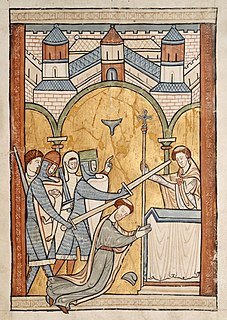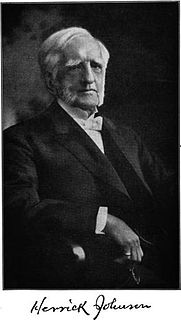A Quote by Thomas Becket
It is important that the Church of London, which has now lost its ruler, should receive for its new bishop a man whose personal merit, attainments in learning, and prudence in managing public business shall not be unworthy of the dignity of that see.
Related Quotes
See that ye all follow the bishop, even as Jesus Christ does the Father, and the presbytery as ye would the apostles; and reverence the deacons, as being the institution of God. Let no man do anything connected with the Church without the bishop. [] Wherever the bishop shall appear, there let the multitude [of the people] also be; even as, wherever Jesus Christ is, there is the Catholic Church. [] Whatsoever [the bishop] shall approve of, that is also pleasing to God, so that everything that is done may be secure and valid.
Obey your bishop! "Obey those set over you [Heb 13:17]," the teachers of the Church... I remind you, my dear friends, of what I said when I was with you: do not receive any outside or unknown preacher, unless he be sent by your bishop or preaches with the permission of the pope. For "how shall they preach unless they are sent [Rom 10:15]?"
Christ has lifted woman to a new place in the world. And just in proportion as Christianity has sway, will she rise to a higher dignity in human life. What she has now, and what she shall have, of privilege and true honor, she owes to that gospel which took those qualities peculiarly and which had been counted weak and unworthy, and gave them a Divine glory in Christ.
The intellectual attainments of a man who thinks for himself resemble a fine painting, where the light and shade are correct, the tone sustained, the colour perfectly harmonised; it is true to life. On the other hand, the intellectual attainments of the mere man of learning are like a large palette, full of all sorts of colours, which at most are systematically arranged, but devoid of harmony, connection and meaning.
Pity the nation whose statesman is a fox, whose philosopher is a juggler, and whose art is the art of patching and mimicking. Pity the nation that welcomes its new ruler with trumpetings, and farewells him with hootings, only to welcome another ruler with trumpetings again. Pity the nation whose sages are dumb with years and whose strong men are yet in the cradle. Pity the nation divided into fragments, each fragment deeming itself a nation.
This is to be observed of the Bishop of London, that, though apparently of a spirit somewhat austere, there is in his idiosyncrasy a strange fund of enthusiasm, a quality which ought never to be possessed by an Archbishop of Canterbury, or a Prime Minister of England. The Bishop of London sympathies with everything that is earnest; but what is earnest is not always true; on the contrary error is often more earnest than truth.
He that hath wife and children hath given hostages to fortune, for they are impediments to great enterprises, either of virtue or mischief. Certainly the best works and of greatest merit for the public have proceeded from the unmarried or childless men, which both in affection and means have married and endowed the public. He was reputed one of the wise men that made answer to the question, when a man should marryA young man not yet, an elder man not at all.
Who were my mentors in poetry and literature? This is a matter of opinion. Some see in my books the influences of authors whose names, in my ignorance, I have not even heard, while others see the influences of poets whose names I have heard but whose writings I have not read. And what is my opinion? From whom did I receive nurture? Not every man remembers the name of the cow which supplied him with each drop of milk he has drunk.
I think there's a faith formula in that verse: believe plus receive equals become. So I think believing's important, having intellectual agreement with Christian doctrine is important, but there has to be a time when we receive God's gift of grace - not that we've earned it or merit it or deserve it - but receive this free gift of forgiveness and eternal life that Jesus purchased on the cross for us.
The foolish ofttimes teach the wise: I strain too much this string of life, belike, Meaning to make such music as shall save. Mine eyes are dim now that they see the truth, My strength is waned now that my need is most; Would that I had such help as man must have, For I shall die, whose life was all men's hope.




































